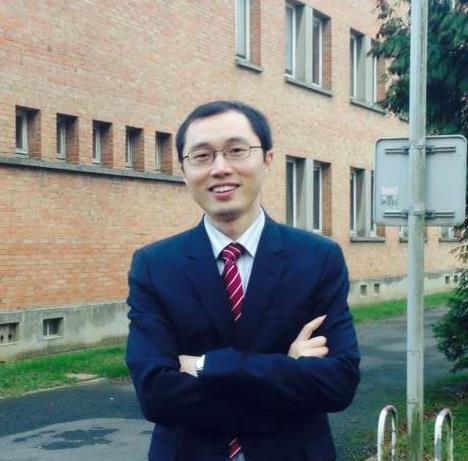羅瓊鵬(Qiongpeng Luo),南京大學文學院教授、博士生導師,南京大學人文社會科學高級研究院駐院研究員。研究方向:漢語語法、語義學、句法學、語言習得。
基本介紹
- 中文名:羅瓊鵬
- 外文名:Qiongpeng Luo
- 國籍:中國
- 畢業院校:北京大學
- 職業:教師
- 性別:男
- 任職院校:南京大學
- 專業方向:現代漢語語法;形式語義學;句法學
- 學位/學歷:博士
人物經歷,研究方向,研究成果,成果綜述,出版編著,發表論文,會議報告,主持項目,研究課題,出版圖書,所授課程,獲獎情況,
人物經歷
2007-2008年在荷蘭烏特列支大學語言學研究院學習,2009年在北京大學獲語言學博士學位,2009-2011年任澳大利亞麥考瑞大學認知科學研究中心/語言學系博士後研究人員(獲澳大利亞聯邦研究委員會資助;合作導師:Stephen Crain)。曾先後受聘香港理工大學中文及雙語學系訪問助理教授 (03/2013-08/2013)、法國阿爾多瓦大學漢學系特聘副教授 (2014-2015) 等職。
研究方向
主要方向為現代漢語語法、形式語義學、句法學,研究旨趣在於用數理邏輯和代數的手段,揭示語言表征背後的運算機制,進而探索人類心智的一般規律。
研究成果
成果綜述
近年來在Journal of East Asian Linguistics (SSCI 和 A&HCI),Language and Linguistics (SSCI 和 A&HCI),Taiwan Journal of Linguistics,《外語教學與研究》,《語言教學與研究》,《語言研究》,《外國語》,《現代外語》等刊物上發表論文30餘篇,此外還有多篇論文被Semantics and Linguistic Theory (SALT),Sinn und Bedeutung (SuB), Generative Linguistics in the Old World (GLOW), Chicago Linguistic Society (CLS) 等同行評議的國際會議接受(發表)。
出版編著
[1] Hsieh, Miao-Ling & Qiongpeng Luo (eds.).2014.The Grammar of Measurement in Chinese (Special Issue of Taiwan Journal of Linguistics 12(2)).
發表論文
[1] 羅瓊鵬,2018,量級結構與漢語形容詞的極性對立問題。《語言研究》第2期:24-31。
[2] Luo, Qiongpeng & Zhiguo Xie. 2018. Degrees as nominalized properties: evidence from differential verbal comparatives in Chinese. In: Proceedings of Sinn und Bedeutung 22 (SuB 22).Berlin: Leibniz-Zentrum Allgemeine Sprachwissenshaft.
[3]羅瓊鵬,2018,等級性、量級結構與漢語性質形容詞分類。《漢語學習》第1期:27-38。
[4] Luo, Qiongpeng. 2018. Approximate constructions usingduo ′more′ in Chinese. In Y. Wu et al. (eds.),CLSW 2017, Lecture Notes in Artificial Intelligence (LNAI)10709, pp. 64-78. Springer International Publishing AG 2018. DOI: 10.1007/978-3-319-73573-3_5
[5] 王媛、羅瓊鵬,2017,現代漢語名量結構的兩種測量義。《語言教學與研究》第6期:82-91。
[6]羅瓊鵬、崔晉,2017,意義的多維性與多維度語義學。《外國語》第5期:11-20。
[7] 王媛、羅瓊鵬,2017,程度視角下“大+時間名詞”結構的語義分析。《雲南師範大學學報(對外漢語教學與研究版)》第3期:36-45。
[8]羅瓊鵬,2017,程度視角下的英漢語比較結構研究。《天津外國語大學學報》第3期:30-38。
[9]羅瓊鵬,2017,歷史語用學視角下的語義演變機制——以“呵呵”的語義嬗變為例。《浙江外國語學院學報》第3期:26-33。
[10] 羅瓊鵬,2017,漢語“比”字比較句的句法和語義問題。《現代外語》第3期:324-335。
[11] Luo, Qiongpeng, Hsieh, Miao-Ling & Dingxu Shi. 2017. Pre-classifier adjectival modification in Mandarin Chinese: a measurement-based analysis.Journal of East Asian Linguistics26(1): 1-36.
[12] Luo, Qiongpeng & Yuan Wang. 2016. When degree meets evaluativity: a multidimensional semantics for the ad-adjectival modifierhao′well′ in Mandarin Chinese.Lecture Notes in Artificial Intelligence (LNAI) Series10085: 475-492. DOI: 10.1007/978-3-319-49508-8_45
[13] 羅瓊鵬,2016,漢語名詞的程度與等級性。《語言學研究》第21輯:97-109。
[14] 羅瓊鵬,2016,匹配性與“都”對事件的量化。《解放軍外國語學院學報》第4期:58-66。
[15] 羅瓊鵬,2016,有“大”無“小”的“大+NP”結構。《漢語學習》第3期:43-52。
[16] 羅瓊鵬,2016,程度,量級與形容詞“真”和“假”的語義。《語言研究》第2期:94-100。
[17] 羅瓊鵬,2015,副詞和形容詞的程度語義研究——以”真假“組合為例。《外文研究》第4期:25-31。
[18]Luo, Qiongpeng & Yuan Wang. 2015. A contrastive analysis ofhenandtingin Chinese. In Q. Lu and H. Gao (Eds.),CLSW 2015,Lecture Notes in Artificial Intelligence (LNAI) 9332, pp. 33-41. Springer. DOI: 10.1007/978-3-319-27193-4_4
[19] Luo, Qiongpeng. 2012.Meianddouin Chinese: a tale of two quantifiers.Taiwan Journal of Linguistics9(2): 111-158.
[20] Luo, Qiongpeng & StephenCrain. 2011. Do Chinesewh-conditionals have relatives in other languages?Language and Linguistics12(4):753-799.
[21] Luo, Qiongpeng & Stephen Crain. 2011. Identity and definiteness in Chinesewh-conditionals. In Reich Ingo et at. (eds.),The Proceedings of Sinn und Bedeutung 15,165-179. Saarbrucken, Germany: Saarland University Press.
[22] Luo,Qiongpeng &Stephen Crain. 2011. Uniqueness and co-variation in Chinesewh-conditionals. In Yukio Otsu (ed.),The Proceedings of the 12th Tokyo Conference on Psycholinguistics. Tokyo: Hituzi Publishing Company.
[23] Crain, Stephen & Qiongpeng Luo. 2010. On the typology ofwh-conditionals in Chinese. In Yukio Otsu (ed.), The Proceedings of the 11the Tokyo Conference on Psycholinguistics, 97-120. Tokyo: Hituzi Publishing Company.
[24]郭銳、羅瓊鵬,2009,複數名詞短語的指稱與“都”量化。載程工、劉丹青主編:《漢語的形式與功能研究》,92-109。北京:商務印書館。
[25]Luo, Qiongpeng. 2008. Functional quantification in distributivity and events: A view from Chinese. In Maribel Romero (ed.),Proceedings of ESSLLI 2008 Workshop ‘What Syntax Feeds Semantics’, 48-59. Germany: Konstanz University.
[26]鄧思穎、羅瓊鵬,2008,湘語中“連”的強調與否定極性。《漢藏語學報》第2期:124-134。
[27]羅瓊鵬,2007,邁向原則性解釋的語言理論:最簡方案最新進展。《語言學研究》第6輯:8-12。
[28]羅瓊鵬,2006,“都”量化與“連…都”結構。《語言學論叢》第34輯:243-265。
[29]羅瓊鵬,2005,“是”的句法與語義屬性。《外語教學與研究》第3期:192-198。(與陳曉湘合作)
[30]羅瓊鵬,2005,負極詞的極端敏感性及允準條件研究。《外語與外語教學》第4期:8-13。(與陳曉湘合作)
[31]羅瓊鵬,2004,兒童早期漢語中的“強跨域”現象研究。《湖南社會科學》第4期:167-169。(與陳曉湘合作)
會議報告
[1] Luo, Qiongpeng & Yuzhen Cao. 2018. Equatives are not all equal: a correlative analysis of scalar equatives in Mandarin Chinese. Poster presented at the 54th Annual Meeting of Chicago Linguistic Society (CLS 54). April 26-28, 2018. Chicago: The University of Chicago.[Conference Link][Abstract]
[2] Luo, Qiongpeng & Zhiguo Xie. 2017. Degrees as nominalized properties: evidence from differential verbal comparatives in Mandarin Chinese. Paper presented at Sinn und Beudeutung 22 (SuB 22). Sept. 10-12, 2017. Berlin/Potsdam: ZAS & University of Potsdam. [Abstract]
[3] Luo, Qiongpeng, Xie, Zhiguo & Miao-Ling Hsieh. 2015. A degree-based analysis of the differential verbal comparatives in Chinese. Paper presented at the 10th International Workshop on Theoretical East Asian Linguistics (TEAL-10). June 13-14, 2015. Tokyo: Tokyo University of Foreign Studies. [Conference Link]
[4] Luo, Qiongpeng & Stephen Crain. 2011. Uniqueness and co-variation in Chinese wh-conditionals. Paper selected for poster presentation at the 21st Semantics and Linguistic Theory (SALT 21). May 20-22, 2011. New Brunswick: Rutgers University. [Conference program]. (Withdrawn)
[5] Luo, Qiongpeng & Stephen Crain. 2011. Uniqueness and co-variation in Chinese wh-conditionals. Paper presented at the 12th Tokyo Conference on Psycholinguistics (TCP 12). June 13-14, 2011.Tokyo: Keio University.
[6] Crain, Stephen & Qiongpeng Luo. 2010. Identity and definiteness in Chinese wh-conditionals. Paper presented at Sinn und Bedeutung 15 (SuB 15). Sept. 9-11, 2010. Saarbrucken, Germany: Saarland University. [Conference link]
[7] Crain, Stephen & Qiongpeng Luo. 2010. On the typology of wh-conditionals in Chinese. Paper presented at the 11th Tokyo Conference on Psycholinguistics (TCP 11). March 12-13, 2010. Tokyo: Keio University.
[8] Luo, Qiongpeng. 2009. A semantic topography for distributivity in Chinese. Paper presented at the 7th Generative Linguistics in the Old World in Asian Conference (GLOW in Asia 7). February 25-28, 2009. Hyderabad, India: English and Foreign Languages University.
[9] Luo, Qiongpeng. 2009. A semantic topography for distributivity in Chinese and its implications. Paper selected for presentation at the 32nd Generative Linguistics in the Old World (GLOW 32) Workshop ′Modes of Composition′. April 15-18, 2009. Nantes: Nantes University. (Withdrawn)
[10] Luo, Qiongpeng. 2008. Functional quantification in distributivity of events: a view from Chinese. Paper presented at the 2008 European Summer School in Logic, Language and Information (ESSLLI 2008) Workshop ′What Syntax Feeds Semantics′. August, 2008. Hamburg, Germany: Hamburg University.
[11] Luo, Qiongpeng. 2008. A new name for some old distributity in Chinese and its implications. Paper accepted as an alternate for presentation at the 34th Annual Conference of Berkeley Linguistic Society (BLS 34). February, 2008. University of California at Berkeley. (Withdrawn)
主持項目
[1] 2016-2020,國家社科基金一般項目“程度語義學與漢語級差性現象研究”(16BYY006)
[2] 2012-2017,教育部人文社科研究基金“現代漢語無標記條件式的語義及其類型學啟發”(12YJC740074)
(已結項:2017JXZ1632)
[3] 2013-2016,教育部留學回國人員科研啟動基金(第46批)
[4] 2013-2016,南京大學文科青年創新團隊項目“測量與程度相關現象的理論闡述”
[5] 2015-2016,江蘇高校省級英文授課精品課程(《語言學概論》)(蘇教辦外(2015)18號)
研究課題
近年來主要研究課題:(1)程度語法與漢語研究;(2)多維度語義學(Multidimensional Semantics);(3)漢語量詞(classifier)結構及其語義解釋;(4)漢語類指(kind reference)現象。
出版圖書
作者類型:
作者時間:2019年8月1日
所授課程
本科生/研究生課程+指導
A. 本科生課程
[1] 《語言學的邏輯基礎》(Logic for Linguistics) Handout
(參考教材:Partee, B. et al. 1990. Mathematical Methods in Linguistics)
[2] 《句法學導論》(An Introduction to Syntax)(2學分,本科生)
[3]《現代語言學流派》(Contemporary Linguistic Theories)(2學分,本科生)
[4] 《語言學概論》(An Introduction to Linguistics)(本科生必修課,3學分)
(參考教材1:Fromkin, V. et al. 2013. An Introduction to Language (the 10th edition). Boston: Wadworth.)
(參考教材2: O′Grady, W. et al. 2017. Contemporary Linguistics: An Introduction(the 7th edition). Macmillan.)
[5]《語義學 I:形式語義學基礎》(Semantics I: An Introduction)
(參考教材:Kearns, Kate.2002. Semantics (the 2nd edition))
B. 研究生課程
[1]《語義學 II:生成語法中的語義學》(Semantics II:Semantics in Generative Grammar)
(參考教材:Heim & Kratzer 1998: Semantics in Generative Grammar)
C.本科論文指導(持續更新中)
[1] 2011級,漢語言文字學專業,陳伊娃(畢業論文題目:《現代漢語程度副詞“很”和“挺”的比較》;畢業去向:無)
[2] 2011級,漢語言文字學專業,黎康(畢業論文題目:《新加坡華語與中國國語形同義異詞考察》;畢業去向:無)
[3] 2012級,漢語言文字學專業,孫葉楠(畢業論文題目:《漢語量化中“每”和“都”的共現問題》;畢業去向:美國芝加哥大學語言學系博士生)
[4] 2014級,漢語言文字學專業,魏紫薇(畢業論文題目:《漢語名詞的等級性——以“很+NP”為例》)
[5] 2014級,漢語言文字學專業,杜雨橋(畢業論文題目:《現代漢語狀態形容詞的程度修飾現象研究》)
D.研究生論文指導(持續更新中)
[1] 2016級,語言學及套用語言學專業,劉智浪(論文方向(暫擬):現代漢語“有+名詞”結構研究)
[2] 2017級,語言學及套用語言學專業,張晨陽(論文方向(暫擬):多維度語義學視角下的現代漢語近義副詞辨析)
[3] 2017級,漢語國際教育碩士,張易(論文方向(暫擬):現代漢語“最+名詞”現象研究及其對外漢語教學)
獲獎情況
[1]2014,南京大學第2屆青年教師人文科研原創獎
[2] 2016,南京大學第4屆青年教師人文科研原創獎
[3] 2017,南京大學“杜廈獎教金”

